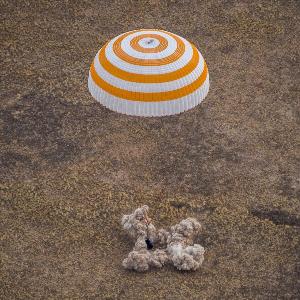
Return from space in 2020. Landing in the steppe of Kazakhstan after 196 days in space. | © Imago / ZUMA Wire / Denis Derevtsov / NASA
Spending long periods in space not only leads to muscle atrophy and reductions in bone density, it also seems to have lasting effects on the brain. Neuroimaging studies (amongst others from this LMU team of researchers) has hinted at this over the last three years. However, little is known if the observed brain-structural alterations are harmless or clinically relevant. LMU physicians Professor Peter zu Eulenburg and Professor Alexander Choukér together with renowned researchers from the University of Gothenburg (Sweden) and Russian colleagues have assessed the structural integrity of the human brain via blood-based markers in astronauts after return from a long-duration mission. The researchers could demonstrate with their pilot study published in JAMA Neurology that there are strong indications for brain injury and accelerated aging following a long-duration mission.
The scientists examined longitudinal blood samples from five cosmonauts that were on average 169 days aboard the International Space Station (ISS). All spaceflyers had given blood just prior to their missions and immediately after return to Earth. Blood was also taken one and three weeks after landing. 'This gave us an unprecedented and detailed window to assess brain-structural health via blood-based markers after long-duration spaceflight', Professor zu Eulenburg points out.






